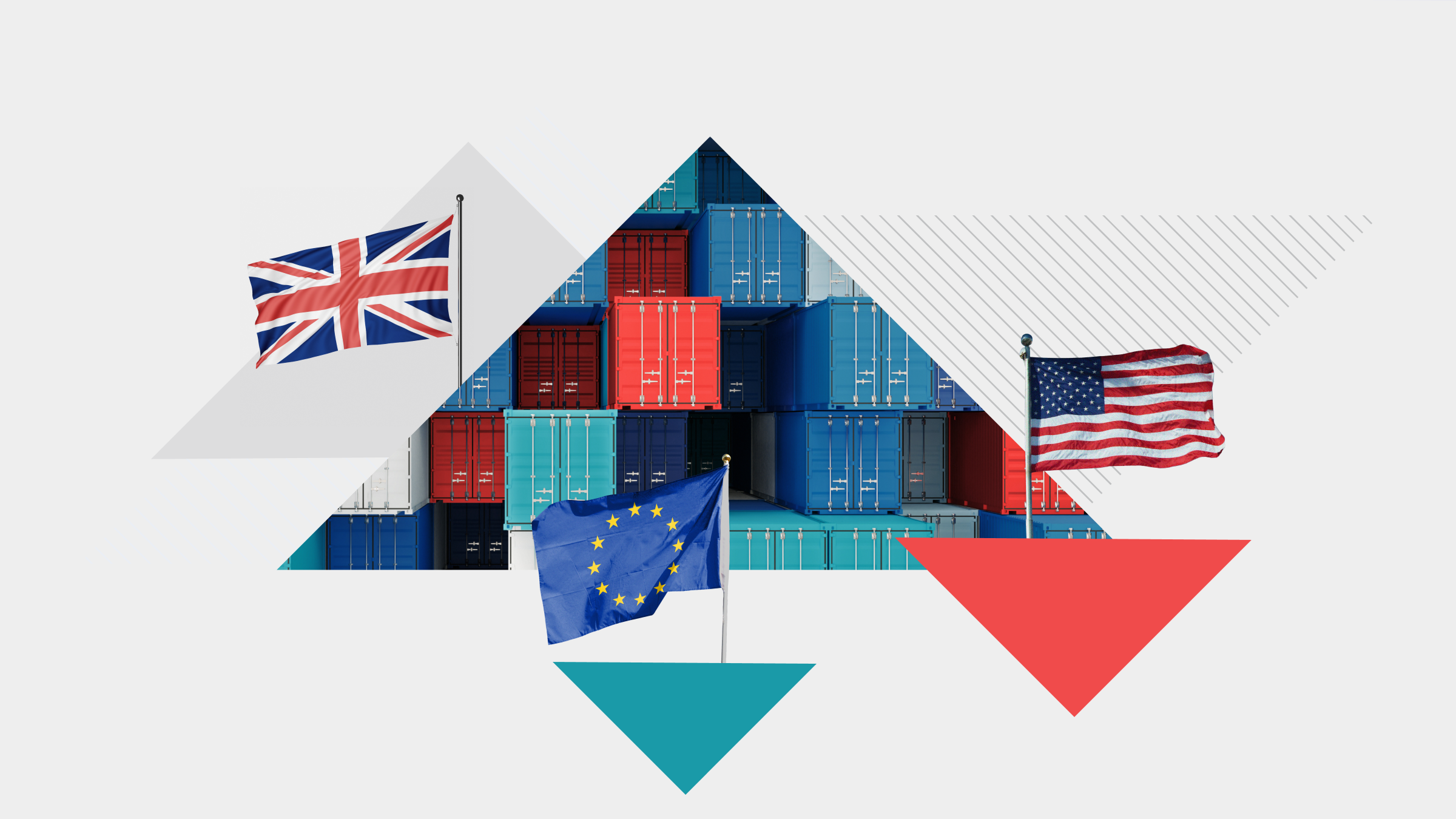Despite lacking the explosive growth of smaller E&P (exploration and production) firms, larger integrated firms can instead offer steady dividends and less risk. In times of market tumult, these firms often provide exposure to oil and natural gas with less volatility.
Of the many global integrated firms, the six largest are often referred to as the super majors. Though they are well-known names and commonly held in many portfolios, at certain times their valuations can become attractive enough to add to current holdings or initiate new positions. We believe this is currently the case with ExxonMobil, which trades well below our fair value estimate. We also view Chevron favourably. While not currently as undervalued as ExxonMobil, Chevron offers the highest exposure to oil production of any super major. A rise in oil prices could provide significant upside to our fair value estimate for Chevron.
Likewise, both Royal Dutch Shell and Total are trading close to our fair value estimate. However, the European firms offer significantly higher dividend yields than their American counterparts and may be appealing holdings in the current low-yield environment.

Please note that the fair value estimates above refer to the ADR shares in the case of BP, Royal Dutch Shell and Total. Fair value estimates for locally-listed shares are 447p for BP, EUR 25 for Shell's NV listing and EUR 44 for Total.
ExxonMobil
ExxonMobil remains our top pick in the super major integrated universe. While its shares have underperformed over the past year, we believe at its current level ExxonMobil should offer attractive returns with minimal risk. ExxonMobil currently trades at a discount to our estimated fair value and at a lower multiple than its historical average. Given its history of delivering superior returns, the company typically commands a premium EV/EBITDA multiple of around 6x. Concerns over the company's recent acquisition of XTO Energy and the possibility of lower returns have likely negatively impacted the stock. However, we believe that ExxonMobil should be able to leverage its financial strength and global footprint with XTO's unconventional resource expertise to deliver production growth at an attractive rate of return. In addition to its global LNG portfolio, the XTO acquisition marks a large bet on natural gas at a time when many E&Ps are trying to increase their exposure to oil. However, ExxonMobil is planning for the long term. The company believes demand will grow substantially over the next few decades as natural gas becomes a preferred fuel given its abundance and low carbon emissions. ExxonMobil is often used as a proxy for those looking to gain exposure to oil prices. However, as the world's largest refiner and one of the largest chemical companies, ExxonMobil is much more than an oil and gas producer. While these two segments have suffered in the global recession of the past year, we believe that with high-quality assets, superior execution, and integration of the upstream and downstream operation, ExxonMobil can deliver industry-leading returns.
Chevron
Though closer to our fair value estimate, we view Chevron as another attractive option among the super majors. In addition to sporting an attractive valuation based on a relatively low EV/EBITDA multiple of our 2011 EBITDA forecast, Chevron also has the most exposure to oil (67% of total production) of any super major. In today's commodity price environment, oil production generally offers higher returns than natural gas production. Also, after delivering industry-leading production growth of 7% last year, Chevron is on track for another strong year with 3% growth. Over the long term Chevron should be able to continue to grow production given its queue of projects and recent exploration success in deepwater locations around the world. Key projects include Chevron's two LNG projects, Gorgon and Wheatstone, in Australia. While these two projects will shift Chevron's production profile more toward natural gas over the next decade, LNG projects generally offer attractive returns given contracts indexed to oil prices and decades-long plateau production levels. Like ExxonMobil, Chevron also has downstream assets. However, Chevron has the smallest percentage of total assets dedicated to refining of any super major. Also, its facilities are highly complex and located in strong markets.
ConocoPhillips
ConocoPhillips is in the midst of executing a strategic plan to improve its returns and close the valuation gap with peers ExxonMobil and Chevron. In addition to its leverage to natural gas and refining, ConocoPhillips made some ill-timed acquisitions in recent years saddling the company with a large debt load. As a result, ConocoPhillips typically trades at a lower multiple than its larger peers. With its strategic plan, the company hopes to address these problems. Over the next two years, ConocoPhillips plans to divest $10 billion worth of assets, with proceeds going toward debt reduction. Also, the company plans to sell its 20% stake in Lukoil during the same period, which could amount to approximately $8 billion and will likely go toward share repurchases. ConocoPhillips also has plans to reduce capital spending and focus on higher-returning exploration and production projects. While we view the company's plans positively, we believe much of the benefit is already reflected in the stock price. Additional asset sales above the initial $10 billion, which could go toward additional share repurchases, could offer additional upside to our fair value estimate.
BP
BP's new CEO Bob Dudley will need to work quickly to set a new course for the firm to restore its reputation in the aftermath of the Macondo oil spill in the Gulf of Mexico. BP now faces major post-spill challenges, including the funding of oil clean up costs and a $20 billion (or more) claims fund and responding to post-spill investigations and government-assigned responsibilities. While shares may appear cheap, uncertainties remain as potential legal penalties and regulatory fines may take years to resolve and are likely to add up to billions of dollars. Despite this, we think BP has the cash resources and funding options to cover the oil spill costs and future claims funding. The firm is about a third of the way to targeted asset sales of up to $30 billion, with agreements for about $10 billion of non-core assets. The firm suspended its 2010 dividend to free up about $10 billion in cash, and scaled back capital spending plans. As spill costs diminish, BP may consider restarting dividend payments. However, we believe BP's most important step will be to apply lessons learned and upgrade safety practices in order to gain approval to operate offshore. New ventures with partners in Egypt and China are early indicators that BP retains the ability to secure new long-term projects, but we'll need to see a steady stream of new deals from BP to support future upstream production growth potential.
Royal Dutch Shell
Royal Dutch Shell is making good progress on its 2010 goals of boosting production with new projects while cutting costs by simplifying its business structure. While we're encouraged by year-over-year quarterly production gains achieved thus far, and by cost-cutting efforts, we believe Shell is currently fairly valued. The firm achieved more than $3.5 billion of annualised cost savings, which is six months ahead of schedule, but our primary focus is on whether recent purchases of US tight gas and Australian gas interests will contribute toward production growth. Shell's cash generation continues to support its dividend, which the firm is holding steady as it keeps capital spending at current levels. We'll monitor the firm's progress over the next two quarters to determine whether project-driven production growth and downstream cost savings are likely to continue into 2011 and beyond. Shell's efforts to expand production at Iraq's Majnoon field, its share of Gorgon LNG in Australia, the BC-10 offshore project in Brazil, and the Kashagan field in Kazakhstan will add to its longer-term production growth potential. Shell plans to commit $3 billion of capital spending each year on exploration, including targets onshore in the US and Canada as well as offshore prospects in the US, Australia, and Brazil to extend production growth prospects well into the end of this decade.
Total
Total kept its sights on longer-term upstream projects even when oil and gas prices tumbled last year, and is now set for 2% annual production growth over the next five years. Production gains of 6% during the first half of 2010 suggest that Total may exceed the 2% targeted growth this year. We expect that production growth targets will get a big assist from ventures in Russia, Algeria, and in the US, where Total has entered into joint ventures to develop onshore shale gas prospects. Also, the acquisition of UTS Energy and its 20% stake in the Fort Hills project increases Total's exposure to Canadian oil sands. We're glad to see the firm move forward with the second phase of Surmont oil sands project in Alberta and offshore projects in the North Sea and Angola. Discoveries in Angola and Nigeria and plans to partner with PetroChina and Petronas to expand production of Iraq's Halfaya field may also support longer-term production growth. Despite these attractive long-term projects, we believe Total's current share price for the most part reflects their potential. Downstream operations remain challenged amid a weak global economy and European financial concerns.


























